Of Studies翻译与鉴赏
培根“Of Studies”的两个译本赏析
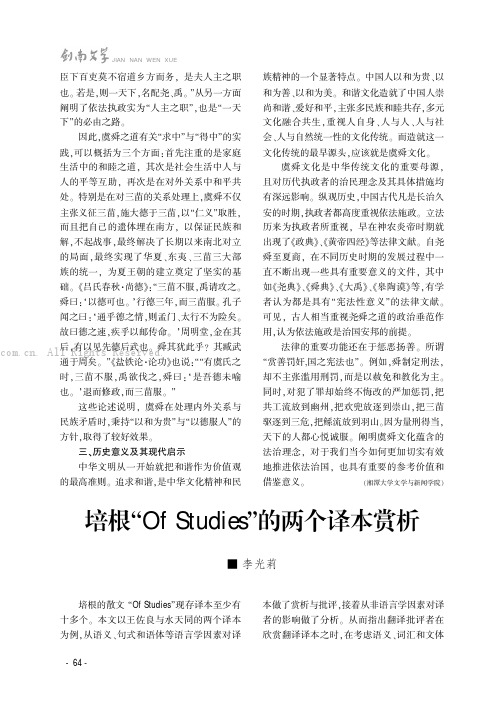
JIAN NAN WEN XUE臣下百吏莫不宿道乡方而务,是夫人主之职也。
若是,则一天下,名配尧、禹。
”从另一方面阐明了依法执政实为“人主之职”,也是“一天下”的必由之路。
因此,虞舜之道有关“求中”与“得中”的实践,可以概括为三个方面:首先注重的是家庭生活中的和睦之道,其次是社会生活中人与人的平等互助,再次是在对外关系中和平共处。
特别是在对三苗的关系处理上,虞舜不仅主张义征三苗,施大德于三苗,以“仁义”取胜,而且把自己的遗体埋在南方,以保证民族和解,不起战事,最终解决了长期以来南北对立的局面,最终实现了华夏、东夷、三苗三大部族的统一,为夏王朝的建立奠定了坚实的基础。
《吕氏春秋·尚德》:“三苗不服,禹请攻之。
舜曰:‘以德可也。
’行德三年,而三苗服。
孔子闻之曰:‘通乎德之情,则孟门、太行不为险矣。
故曰德之速,疾乎以邮传命。
’周明堂,金在其后,有以见先德后武也。
舜其犹此乎?其臧武通于周矣。
”《盐铁论·论功》也说:““有虞氏之时,三苗不服,禹欲伐之,舜曰:‘是吾德未喻也。
’退而修政,而三苗服。
”这些论述说明,虞舜在处理内外关系与民族矛盾时,秉持“以和为贵”与“以德服人”的方针,取得了较好效果。
三尧历史意义及其现代启示中华文明从一开始就把和谐作为价值观的最高准则。
追求和谐,是中华文化精神和民族精神的一个显著特点。
中国人以和为贵、以和为善、以和为美。
和谐文化造就了中国人崇尚和谐、爱好和平,主张多民族和睦共存,多元文化融合共生,重视人自身、人与人、人与社会、人与自然统一性的文化传统。
而造就这一文化传统的最早源头,应该就是虞舜文化。
虞舜文化是中华传统文化的重要母源,且对历代执政者的治民理念及其具体措施均有深远影响。
纵观历史,中国古代凡是长治久安的时期,执政者都高度重视依法施政。
立法历来为执政者所重视,早在神农炎帝时期就出现了《政典》、《黄帝四经》等法律文献。
自尧舜至夏商,在不同历史时期的发展过程中一直不断出现一些具有重要意义的文件,其中如《尧典》、《舜典》、《大禹》、《皋陶谟》等,有学者认为都是具有“宪法性意义”的法律文献。
Of studies原文译文及赏析教学提纲

O f s t u d i e s原文译文及赏析培根Of Studies原文及三个版本的汉译【原文】Studies serve for delight, for ornament, and for ability. Their chief use for delight, is in privateness and retiring; for ornament, is in discourse; and for ability, is in the judgment and disposition of business. For expert men can execute, and perhaps judge of particulars, one by one; but the general counsels, and the plots and marshalling of affairs come best from those that are learned.To spend too much time in studies is sloth; to use them too much for ornament is affection; to make judgment wholly by their rules is the humor of a scholar. They perfect nature and are perfected by experience: for natural abilities are like natural plants, that need pruning by study, and studies themselves do give forth directions too much at large, except they be bounded in by experience.Crafty men contemn studies, simple men admire them, and wise men use them, for they teach not their own use; but that is a wisdom without them and above them, won by observation. Read not to contradict and confuse; nor to believe and take for granted; nor to find talk and discourse; but to weigh and consider.Some books are to be tasted, others to be swallowed, and some few to be chewed and digested; that is some books are to be read only in parts; others to be read, but not curiously; and some few to be ready wholly, and with diligence and attention. Some books also may be read by deputy and extracts made of them by others; but that would be only in the less important arguments, and the meaner sort of books; else distilled books are, like common distilled waters, flashy things.Reading makes a full man; conference a ready man; and writing an exact man. And therefore, if a man write little, he had need have a great memory; if he confer little, he had need have a present wit; and if he read little, he had need have much cunning to seem to know that he doth not.Histories make men wise; poets witty; the mathematics subtle; natural philosophy deep; moral grave; logic and rhetoric able to contend. Abeunt studia in mores. Nay there is no stond or impediment in the wit, but may be wrought out by fit studies: like as diseases of the body may have appropriate exercises. Bowling is good for the stone and reins; shooting for the lungs and breast; gentle walking for the stomach; riding for the head; and the like. So if a man’s wit be wandering, let him study the mathematics; for in demonstrations, if his wit be called away never so little, he must begin again. If his wit be not apt to distinguish or find differences, let him study the schoolmen; for they are symini sectores. If he be not apt to beat over matters, and to call up one thing to prove and illustrate another, let him study the lawyers’ cases. So every defect of the mind ma y have a special receipt.Abeunt studia in mores: Studies pass into the characterSymini sectores: dividers of cumin seeds, or hair-splitters【译文】一、王佐良译:谈读书读书足以怡情, 足以傅彩, 足以长才。
Of Studies译文对比赏析5页word

Of Studies译文对比赏析一、原作写作风格Of Studies的语言风格和现代英语颇为不同。
与时文相比,它显得有点像古文。
全文以读书(study)为中心展开讨论,环环相扣,意思逐层递进。
文字精炼,语言简约、潇洒、比喻恰当,富于想象力,处处透露出美感与智慧,说服力十足,论断分明,尤以富含哲理的名言警句见长,字里行间饱含自信。
不时结合使用拉丁文,使文章带有古香古色的韵味,书卷气十足。
二、对比分析严复提出翻译要做到信、达、雅,对于散文,我认为译者在做到信、达的同时,更要注重雅。
在通篇的行文上,要追求风格的一致性。
如前文所言,该散文语言精炼,文章短小精悍,所以翻译的难处在于再现语言简约优美风格的同时又不失其说服力,实现刚和柔的完美结合。
在此,我将挑选王佐良和廖运范的译文(以下简称为王译和廖译)来作比较分析。
1.对比一下两篇译文的风格王译采用半文半白的语言形式,四字词的使用频率高,语言简洁,与原文的风格十分接近,而廖译则用现代汉语的形式,使文章显得十分通俗易懂。
如果按照奈达所提倡的意义的对应必须优先于文体上的对应这一言论来分析这两篇译文,那么这两篇译文都忠实于原文,在读者中产生的效应是相当的。
但是,若按照科勒提出的对等观点来研究翻译对等和等效的问题,那么王译就脱颖而出了。
科勒所提出的除了外延对等(denotativeequivalence),主要研究词汇方面;还包括内涵对等(connotative equivalence),即文体对等,关注文体效果,古体的或是平实的;语篇规约对等(text-normative equivalence),关注不同交际场景的用法;语用对等(pragmatic equivalence),指为特定的读者群进行翻译和形式对等(formal equivalence),针对的是韵律、隐喻和其他修辞手法的对等。
王译在做到词汇、文章意义对等的同时,采用半古文的形式,凸显了文体风格的对等,译文中再现原文的排比句和其他的修辞手法,实现了翻译的形式对等。
培根的《论读书》OfStudies(原文和译文)
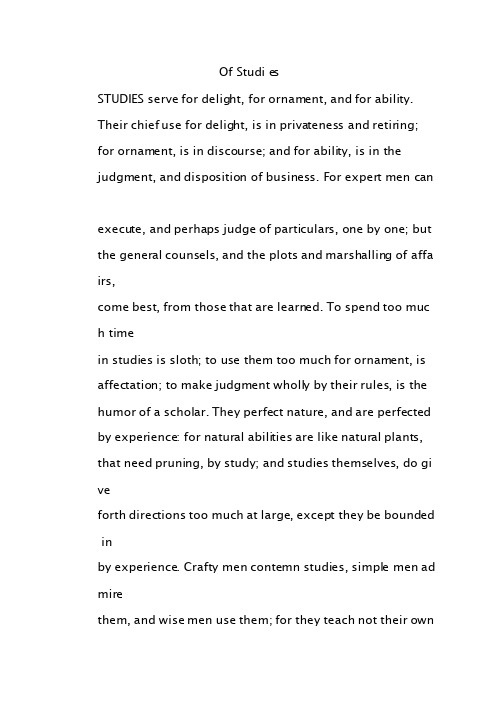
Of Studie sSTUDIE S servefor deligh t, for orname nt, and for abilit y. Theirchiefuse for deligh t, is in privat eness and retiri ng; for orname nt, is in discou rse; and for abilit y, is in the judgme nt, and dispos ition of busine ss. For expert men canexecut e, and perhap s judgeof partic ulars, one by one; but the genera l counse ls, and the plotsand marsha lling of affa ir s,come best, from thosethat are learne d. To spendtoo muc h timein studie s is sloth; to use them too much for orname nt, is affect ation; to make judgme nt wholly by theirrules, is the humorof a schola r. They perfec t nature, and are perfec ted by experi ence: for natura l abilit ies are like natura l plants, that need prunin g, by study; and studie s themse lves, do gi veforthdirect ionstoo much at large, except they be bounde d inby experi ence. Crafty men contem n studie s, simple men ad mirethem, and wise men use them; for they teachnot theirownbut that is a wisdom withou t them, and abovethem, won b yobserv ation. Read not to contra dictand confut e; nor to beli ev eand take for grante d; nor to find talk and discou rse; but to weighand consid er. Some booksare to be tasted, others t o beswallo wed, and some few to be chewed and digest ed; that i s,some booksare to be read only in parts; others to be read,but not curiou sly; and some few to be read wholly, and wit hdilige nce and attent ion. Some booksalso may be read by d eputy,and extrac ts made of them bother s; but that wouldbe only inthe less import ant argume nts, and the meaner sort of book s,else distil led booksare like common distil led waters, flashyReadin g make a full man; confer encea readyman; and writ in gan exactman. And theref ore, if a man writelittle, he had need have a greatmemory; if he confer little, he had need have a presen t wit: and if he read little, he had need have much cunnin g, to seem to know, that he doth not. Histor ie smake men wise; poetswitty; the mathem atics subtit le; nat ura lphilos ophydeep; moralgrave; logicand rhetor ic able to co nten d.Abeunt studia in mores. Nay, thereis no standor impedi m entinthe wit, but may be wrough t out by fit studie s; like as diseasesof the body, may have approp riate exerci ses. Bowlin g is go od forthe stoneand reins; shooti ng for the lungsand ***; gentle walkin g for the stomac h; riding for the head; and the like. Soif a man's wit be wander ing, let him studythe mathem atics ; forin demons trati ons, if his wit be called away neverso little, he must beginagain. If his wit be not apt to distin guish or find differ ences, let him studythe School men; for they are Cymini sector s. If he be not apt to beat over matter s, and tocall up one thingto proveand illust rateanothe r, let him st udythe lawyer s' cases. So everydefect of the mind, may have a specia l receip t.论读书王佐良译读书足以怡情,足以傅彩,足以长才。
Of-Studies翻译与鉴赏演示教学

1摭(zhí):拾取/摘取(pick up; gather)
2傅:涂抹(如“傅粉”)
2
For expert men1 can execute 2, and perhaps judge of particulars3, one by one; but the general counsels4, and the plots, and marshalling of affairs5, come best from those that are learned.
4 counsel: something that provides direction or advice as to a decision or course of action忠告/劝告/建议
general counsel总的计划/大计
5plots: a secret scheme to do something (especially something underhand or illegal(秘密)计划/密谋/谋划/出谋划策
Of-Studies翻译与鉴赏
1
Studies serve for1 delight, for ornament2, and for ability.
Their chief use for delight, is in privateness and retiring3;
for ornament, is in discourse4; and for ability, is in the
1专家/能手/内行/阅历丰富的人 2 carry out/perform an action; to put into effect执行
of studies中英赏析

of studies中英赏析《论研究》是英国文学家培根(Francis Bacon)的一篇经典散文,它以对学习和研究的思考为主题,阐述了研究的重要性和方法。
本文旨在通过对《论研究》的中英赏析,探讨其思想内涵和艺术特点。
《论研究》一文由五个部分组成,分别是“阅读使人完善”、“交谈使人机智”、“写作使人严谨”、“思考使人深刻”和“各种学习方法的效果比较”。
整篇文章以简明扼要的语言,阐述了学习和研究的不同方式对于提高个人能力的重要作用。
文章提到阅读的重要性。
培根认为,阅读使人完善,开拓了人的眼界,丰富了知识储备。
他强调了对于书籍的选择要有所取舍,要选择经典著作和有深度的内容进行阅读。
通过阅读,人们可以获取到前人的智慧和经验,提高自己的见识和理解能力。
文章讲述了交谈的价值。
培根认为,交谈可以使人变得机智。
在与他人的交流中,人们不仅可以学到新的知识,还可以通过与他人的观点碰撞,提高自己的思维能力和逻辑思维能力。
同时,交谈也是一种锻炼表达能力和沟通能力的方式。
接着,文章提到了写作的重要性。
培根认为,写作使人变得严谨。
通过写作,人们可以把自己的想法和观点清晰地表达出来,从而更好地理清思路,提高自己的逻辑思维能力和表达能力。
同时,写作也是一种对于自己思考的检验,可以帮助人们发现自己的不足和问题,进一步提高自己的学术能力。
然后,文章讲述了思考的重要性。
培根认为,思考使人变得深刻。
通过对问题的思考,人们可以深入理解问题的本质和内涵,从而提高自己的分析和解决问题的能力。
培根强调了思考的方法和技巧,比如要善于提出问题、善于质疑和思考多个角度等。
文章对比了各种学习方法的效果。
培根认为,阅读是最基本的学习方法,通过阅读可以获取到大量的知识。
但是,阅读单一的知识来源可能会导致思维的狭窄,因此,培根提倡多种学习方法的结合使用,如阅读、交谈、写作和思考的有机结合。
总结来说,《论研究》是一篇关于学习和研究的经典散文,强调了阅读、交谈、写作和思考对于提高个人能力的重要作用。
ofstudies赏析
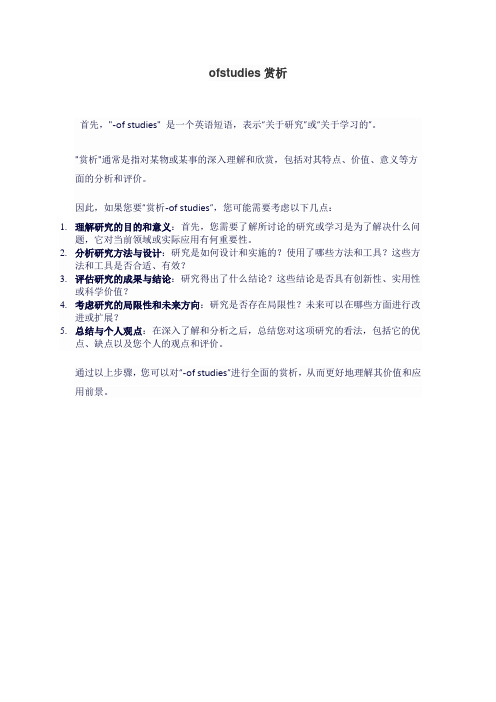
ofstudies赏析
首先,"-of studies" 是一个英语短语,表示“关于研究”或“关于学习的”。
"赏析"通常是指对某物或某事的深入理解和欣赏,包括对其特点、价值、意义等方面的分析和评价。
因此,如果您要“赏析-of studies”,您可能需要考虑以下几点:
1.理解研究的目的和意义:首先,您需要了解所讨论的研究或学习是为了解决什么问
题,它对当前领域或实际应用有何重要性。
2.分析研究方法与设计:研究是如何设计和实施的?使用了哪些方法和工具?这些方
法和工具是否合适、有效?
3.评估研究的成果与结论:研究得出了什么结论?这些结论是否具有创新性、实用性
或科学价值?
4.考虑研究的局限性和未来方向:研究是否存在局限性?未来可以在哪些方面进行改
进或扩展?
5.总结与个人观点:在深入了解和分析之后,总结您对这项研究的看法,包括它的优
点、缺点以及您个人的观点和评价。
通过以上步骤,您可以对“-of studies”进行全面的赏析,从而更好地理解其价值和应用前景。
ofstudies翻译
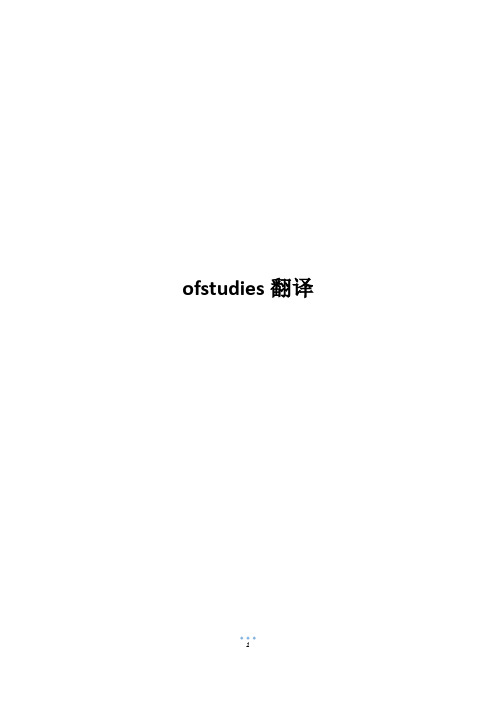
ofstudies翻译of studies翻译为谈读书、论读书、论学习、学习委员。
其中英语单词studies是study的第三人称单数和复数,可作名词和动词,作名词时,意为学习、研究、功课、用于某些学科名称等,作动词时,意为攻读、审视、调查等。
of studies的中文翻译及双语例句of studies中文翻译为谈读书、论读书、论学习、学习委员等含义。
1、A couple of studies on perception.来看一组关于感知的研究。
2、Premature delivery is tied to increased heart risks in the mother, a review of studies has found.一项研究综述称,母亲心脏病风险增加与早产有关。
3、There have been lots of studies that have shown how dogs decrease stress levels.有大量的研究表明狗狗是怎样降低压力水平的。
4、Langer had already undertaken a couple of studies involving elderly patients.在此之前,兰格已经进行了两项涉及老年患者的研究。
5、Only 27 percent of studies were randomized, and only 14 percent were blinded.只有27%的设备是随机研究,仅14%采用的是盲法研究。
6、A number of studies seem to suggest this may be the case. 一系列研究证明,事实似乎确是如此。
7、The duration of studies leading to higher level diplomas depends on the type of faculty.较高水平的文凭学习年限由专业类型来决定。
(完整版)培根的《论读书》OfStudies(原文和译文)

(完整版)培根的《论读书》OfStudies(原文和译文)Of StudiesSTUDIES serve for delight, for ornament, and for ability. Their chief use for delight, is in privateness and retiring; for ornament, is in discourse; and for ability, is in the judgment, and disposition of business. For expert men canexecute, and perhaps judge of particulars, one by one; but the general counsels, and the plots and marshalling of affa irs, come best, from those that are learned. To spend too muc h timein studies is sloth; to use them too much for ornament, is affectation; to make judgment wholly by their rules, is the humor of a scholar. They perfect nature, and are perfected by experience: for natural abilities are like natural plants, that need pruning, by study; and studies themselves, do gi veforth directions too much at large, except they be bounded inby experience. Crafty men contemn studies, simple men ad mirethem, and wise men use them; for they teach not their own but that is a wisdom without them, and above them, won b yobservation. Read not to contradict and confute; nor to beli eveand take for granted; nor to find talk and discourse; but to weigh and consider. Some books are to be tasted, others t o be swallowed, and some few to be chewed and digested; that i s,some books are to be read only in parts; others to be read,but not curiously; and some few to be read wholly, and wit h diligence and attention. Some books also may be read by d eputy,and extracts made of them bothers; but that would be only inthe less important arguments, and the meaner sort of book s,else distilled books are like common distilled waters, flashy Reading make a full man; conference a ready man; and writ ingan exact man. And therefore, if a man write little, he had need have a great memory; if he confer little, he had need have a present wit: and if he read little, he had need have much cunning, to seem to know, that he doth not. Historie smake men wise; poets witty; the mathematics subtitle; nat uralphilosophy deep; moral grave; logic and rhetoric able to co ntend.Abeunt studia in mores. Nay, there is no stand or impedim ent inthe wit, but may be wrought out by fit studies; like as disea sesof the body, may have appropriate exercises. Bowling is go od forthe stone and reins; shooting for the lungs and ***; gentle walking for the stomach; riding for the head; and the like. So if a man's wit be wandering, let him study the mathematics ; forin demonstrations, if his wit be called away never so little, he must begin again. If his wit be not apt to distinguish or finddifferences, let him study the Schoolmen; for they are Cymini sectors. If he be not apt to beat over matters, and t ocall up one thing to prove and illustrate another, let him st udythe lawyers' cases. So every defect of the mind, may have a special receipt.论读书王佐良译读书足以怡情,足以傅彩,足以长才。
of studies 译文

[译文]一、王佐良译:谈读书读书足以怡情,足以傅彩,足以长才。
其怡情也,最见于独处幽居之时;其傅彩也,最见于高谈阔论之中;其长才也,最见于处世判事之际。
练达之士虽能分别处理细事或一一判别枝节,然纵观统筹、全局策划,则舍好学深思者莫属。
读书费时过多易惰,文采藻饰太盛则矫,全凭条文断事乃学究故态。
读书补天然之不足,经验又补读书之不足,盖天生才干犹如自然花草,读书然后知如何修剪移接;而书中所示,如不以经验范之,则又大而无当。
有一技之长者鄙读书,无知者羡读书,唯明智之士用读书,然书并不以用处告人,用书之智不在书中,而在书外,全凭观察得之。
读书时不可存心诘难作者,不可尽信书上所言,亦不可只为寻章摘句,而应推敲细思。
书有可浅尝者,有可吞食者,少数则须咀嚼消化。
换言之,有只须读其部分者,有只须大体涉猎者,少数则须全读,读时须全神贯注,孜孜不倦。
书亦可请人代读,取其所作摘要,但只限题材较次或价值不高者,否则书经提炼犹如水经蒸馏,淡而无味矣。
读书使人充实,讨论使人机智,笔记使人准确。
因此不常做笔记者须记忆特强,不常讨论者须天生聪颖,不常读书者须欺世有术,始能无知而显有知。
读史使人明智,读诗使人灵秀,数学使人周密,科学使人深刻,伦理学使人庄重,逻辑修辞之学使人善辨:凡有所学,皆成性格。
人之才智但有滞碍,无不可读适当之书使之顺畅,一如身体百病,皆可借相宜之运动除之。
滚球利睾肾,射箭利胸肺,漫步利肠胃,骑术利头脑,诸如此类。
如智力不集中,可令读数学,盖演算须全神贯注,稍有分散即须重演;如不能辨异,可令读经院哲学,盖是辈皆吹毛求疵之人;如不善求同,不善以一物阐证另一物,可令读律师之案卷。
如此头脑中凡有缺陷,皆有特药可医。
二、廖运范译文论读书读书能给人乐趣、文雅和能力。
人们独居或退隐的时候,最能体会到读书的乐趣;谈话的时候,最能表现出读书的文雅;判断和处理事务的时候,最能发挥由读书而获得的能力。
那些有实际经验而没有学识的人,也许能够一一实行或判断某些事物的细微末节,但对于事业的一般指导、筹划与处理,还是真正有学问的人才能胜任。
Of-studies原文译文及赏析
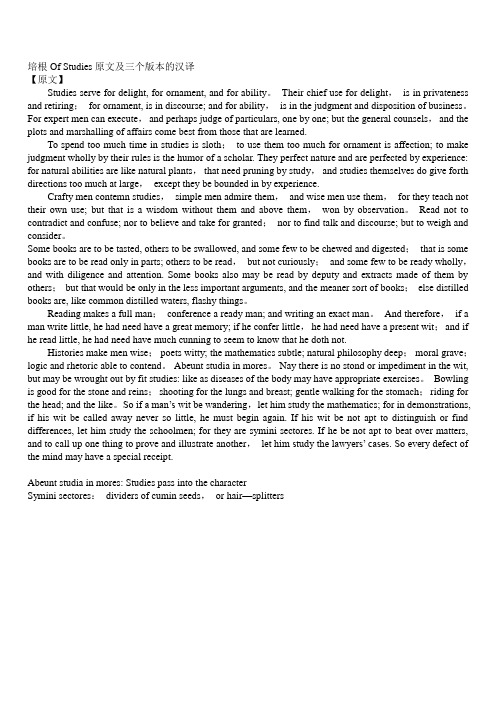
培根Of Studies原文及三个版本的汉译【原文】Studies serve for delight, for ornament, and for ability。
Their chief use for delight,is in privateness and retiring;for ornament, is in discourse; and for ability,is in the judgment and disposition of business。
For expert men can execute,and perhaps judge of particulars, one by one; but the general counsels,and the plots and marshalling of affairs come best from those that are learned.To spend too much time in studies is sloth;to use them too much for ornament is affection; to make judgment wholly by their rules is the humor of a scholar. They perfect nature and are perfected by experience: for natural abilities are like natural plants,that need pruning by study,and studies themselves do give forth directions too much at large,except they be bounded in by experience.Crafty men contemn studies,simple men admire them,and wise men use them,for they teach not their own use; but that is a wisdom without them and above them,won by observation。
精编英汉互译 对比赏析 Of Study

To spend too much time in studies is sloth; to use them too much for ornament,is affection; to make judgment wholly by their rules, is the humour of scholar.
王佐明先生用了“易”、
Affection: the feeSinlogtohf: the bad habit of
“则”、“乃”3字形象地 Humor: thleiksintagteoor floyvoiunrgfsebe/lsinthgbseing lazy and
译出了排比,又避免重复,可 or mind atvaepryarmtiucuchlarantidmceuan感rwin觉igll,ing to work 懒散,
谓是惟妙惟肖。
心情,精神a状bo态ut(th牛em津喜词爱典,P怠1钟0惰0爱0() 牛津词典P1893)
王译:
(牛矫,全凭条文断事乃学究故态。
孙译:
过度沉溺于学习是怠惰;过度炫耀学问是华而不实;食书不化乃书生之大疾。
廖译:
耗费过多的时间去读书便是迟滞,过分用学问自炫便是矫揉造作,而
王译:练达之士虽能分别处理细事或一一判别枝节,然纵观统筹、
全局策划,则舍好学深思者莫属
廖译:那些有实际经验而没有学识的人,也许能够一一实行或判断
某些事物的细微末节,但对于事业的一般指导、筹划与处理,还是 真正有学问的人才能胜任。
孙译:因为专于一技者可以操持或判断一事一物,而唯有博学之士
方能纵观全局,通权达变。
保证原文意思不变的情况下,译文必须改变词类,这就叫做 词类转换法。
Of studies 译文赏析
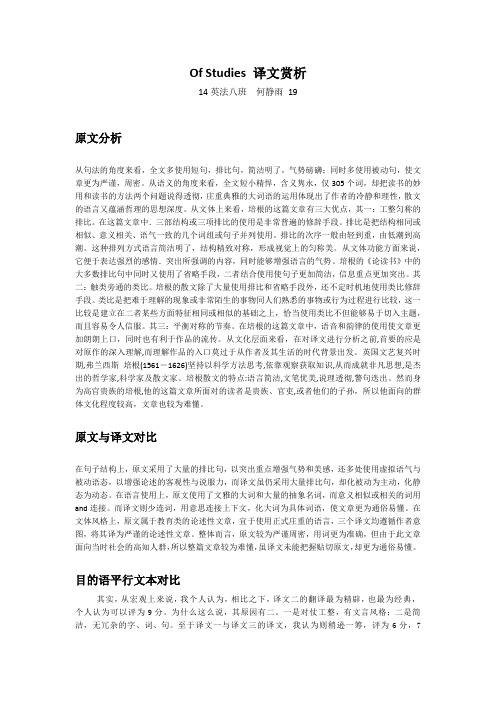
Of Studies 译文赏析14英法八班何静雨19原文分析从句法的角度来看,全文多使用短句,排比句,简洁明了,气势磅礴;同时多使用被动句,使文章更为严谨,周密。
从语义的角度来看,全文短小精悍,含义隽永,仅305个词,却把读书的妙用和读书的方法两个问题说得透彻,庄重典雅的大词语的运用体现出了作者的冷静和理性,散文的语言又蕴涵哲理的思想深度。
从文体上来看,培根的这篇文章有三大优点,其一:工整匀称的排比。
在这篇文章中.三部结构或三项排比的使用是非常普遍的修辞手段。
排比是把结构相同或相似、意义相关、语气一致的几个词组或句子并列使用。
排比的次序一般由轻到重,由低潮到高潮。
这种排列方式语言简洁明了,结构精致对称,形成视觉上的匀称美。
从文体功能方面来说,它便于表达强烈的感情.突出所强调的内容,同时能够增强语言的气势。
培根的《论读书》中的大多数排比句中同时又使用了省略手段,二者结合使用使句子更加简洁,信息重点更加突出。
其二:触类旁通的类比。
培根的散文除了大量使用排比和省略手段外,还不定时机地使用类比修辞手段。
类比是把难于理解的现象或非常陌生的事物同人们熟悉的事物或行为过程进行比较,这一比较是建立在二者某些方面特征相同或相似的基础之上,恰当使用类比不但能够易于切入主题,而且容易令人信服。
其三:平衡对称的节奏。
在培根的这篇文章中,语音和韵律的使用使文章更加朗朗上口,同时也有利于作品的流传。
从文化层面来看,在对译文进行分析之前,首要的应是对原作的深入理解,而理解作品的入口莫过于从作者及其生活的时代背景出发。
英国文艺复兴时期,弗兰西斯培根(1561―1626)坚持以科学方法思考,依靠观察获取知识,从而成就非凡思想,是杰出的哲学家,科学家及散文家。
培根散文的特点:语言简洁,文笔优美,说理透彻,警句迭出。
然而身为高官贵族的培根,他的这篇文章所面对的读者是贵族、官吏,或者他们的子孙,所以他面向的群体文化程度较高,文章也较为难懂。
英汉互译 对比赏析 Of Study
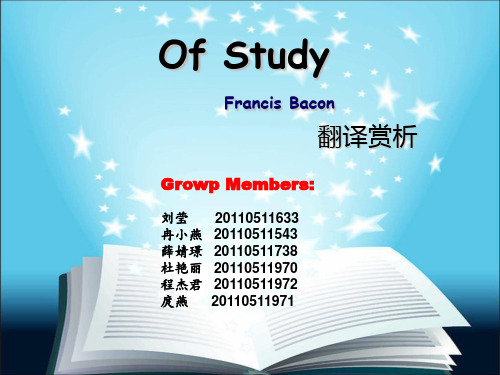
To spend too much time in studies is sloth; to use them too much for ornament,is affection; to make judgment wholly by their rules, is the humour of scholar.
一:作品简介
Of Study选自于培根的 《论说文集》是培根400年前 撰写的一篇探讨读书问题的 散文杂记,亦是英语文学中 妇孺皆知的劝学名篇。 Of Studies从读书之功用立 论,分析了读书学习对人生 不同凡响的意义。同时人们 对读书学习态度之取向、方 法之别异,也直接影响到了 学习效果的泾渭两色。由于 文章写于十七世纪早期,其语 言属于早期现代英语。
1:王译 把 expert man 译为练达之士。练达之士 是指阅历丰富的人,与后面的好学深思者不能形成 对比关系。 2:孙译较好,专于一技者与博学之士相对应,与原 文的“but”之意相呼应。
execute [ˈɛksɪˌkjut] 1、处决,处死 (牛津字典p592) 2、实行,实施 3、完成 4、(法律文件)生效
翻译主张
1.采用辩证的观点,即该直译则直译,该意译则 意译
2.译者只应该译与自己风格相近的作品 3.译者必须是一个真正意义的文化人 4.一切照原作,雅俗如之,深浅如之,口气如之,
文体如之 5. 以诗译诗,诗人译诗 6. 译语要生动活泼锤炼
三:翻译赏析 have an effect
Studies serve for delight, for ornament, and for ability.
谓是惟妙惟肖。
心情,பைடு நூலகம்神a状bo态ut(th牛em津喜词爱典,P怠1钟0惰0爱0() 牛津词典P1893)
培根美文论读书原文及三种译文鉴赏

培根美文论读书原文及三种译文鉴赏阅读是我们获取知识的重要手段,下面是培根着名的关于读书的一篇美文——论读书,并奉上另外两个版本的译文;对于好的书,可以多加研读,对于普通书籍,知其大意即可,就像在中,阅读是弹性的,你可以选择对内容把握程度的深浅;“有些书可以浅尝辄止,有些书可以生吞,而有少数书应该细嚼慢咽,融会贯通”——谈读书——王佐良译读书足以怡情,足以博彩,足以长才;其怡情也,最见于独处幽居之时;其博彩也,最见于高谈阔论之中;其长才也,最见于处世判事之际;练达之士虽能分别处理细事或一一判别枝节,然纵观统筹、全局策划,则舍好学深思者莫属; 读书费时过多易惰,文采藻饰太盛则矫,全凭条文断事乃学究故态;读书补天然之不足,经验又补读书之不足,盖天生才干犹如自然花草,读书然后知如何修剪移接;而书中所示,如不以经验范之,则又大而无当; 有一技之长鄙读书,无知者慕读书,唯明智之士用读书,然读书并不以用处告人,用书之智不在书中,而在书外,全凭观察得之;读书时不可存心诘难作者,不可尽信书上所言,亦不可只为寻章摘句,而应推敲细思; 书有可浅尝者,有可吞食者,少数则须咀嚼消化;换言之,有只须读其部分者,有只须大体涉猎者,少数则须全读,读时须全神贯注,孜孜不倦;书亦可请人代读,取其所作摘要,但只限题材较次或价值不高者,否则书经提炼犹如水经蒸馏,淡而五味矣; 读书使人充实,讨论使人机智,笔记使人准确;因此不常做笔记者须记忆特强,不常讨论者须天生聪颖,不常读书者须欺世有术,始能无知而显有知; 读史使人明智,读诗使人灵秀,数学使人周密,科学使人深刻,论理学使人庄重,逻辑修辞之学使人善辩:凡有所学,皆成性格;人之才智但有滞碍,无不可读适当之书使之顺畅,一如身体百病,皆可借相宜之运动除之;滚球利睾肾,射箭利胸肺,慢步利肠胃,骑术利头脑,诸如此类;如智力不集中,可令读数学,盖演算须全神贯注,稍有分散即须重演;如不能辨异,可令读经院哲学,盖是辈皆吹毛求疵之人;如不善求同,不善以一物阐证另一物,可令读律师之案卷;如此头脑中凡有缺陷,皆有特药可医;原文音频Of Studies——Francis BaconStudies serve for delight, for ornament, and for ability. Their chief use for delight, is in privateness and retiring; for ornament, is in discourse; and for ability, is in the judgment and disposition of business. For expert men can execute, and perhaps judge of particulars, oneby one; but the general counsels, and the plots and marshalling of affairs come best from those that are learned.To spend too much time in studies is sloth; to use them too much for ornament is affection; to make judgment wholly by their rules is the humor of a scholar. They perfect nature and are perfected by experience: for natural abilities are like natural plants, that need pruning by study, and studies themselves do give forth directions too much at large, except they be bounded in by experience.Crafty men contemn studies, simple men admire them, and wise men use them, for they teach not their own use; but that is a wisdom without them and above them, won by observation. Read not to contradict and confuse; nor to believe and take for granted; nor to find talk and discourse; but to weigh and consider.Some books are to be tasted, others to be swallowed, and some few to be chewed and digested; that is some books are to be read only in parts; others to be read, but not curiously; and some few to be ready wholly, and with diligence and attention. Some books also may be read by deputy and extracts made of them by others; but that would be only in the less important arguments, and the meaner sort of books; else distilled books are, like common distilled waters, flashy things.Reading makes a full man; conference a ready man; and writing an exact man. And therefore, if a man write little, he had need have a great memory; if he confer little, he had need have a present wit; and if he read little, he had need have much cunning to seem to know that he doth not.Histories make men wise; poets witty; the mathematics subtle; natural philosophy deep; moral grave; logic and rhetoric able to contend.Abeunt studia in mores. Nay there is no stond or impediment in the wit, but may be wrought out by fit studies: like as diseases of the body may have appropriate exercises. Bowling is good for the stone and reins; shooting for the lungs and breast; gentle walking for the stomach; riding for the head; and the like. So if a man’s wit be wandering, let him study the mathematics; for in demonstrations, if his wit be called away never so little, he must begin again. If his wit be not apt to distinguish or find differences, let him study the schoolmen; for they are cymini sectores. If he be not apt to beat over matters, and to call up one thing to prove and illustrate another, let him study the lawyers’ cases. So every defect of the mind may have a special receipt.论读书——廖运范译读书能给人乐趣、文雅和能力;人们独居或退隐的时候,最能体会到读书的乐趣;谈话的时候,最能表现出读书的文雅;判断和处理事务的时候,最能发挥由读书而获得的能力;那些有实际经验而没有学识的人,也许能够一一实行或判断某些事物的细微末节,但对于事业的一般指导、筹划与处理,还是真正有学问的人才能胜任; 耗费过多的时间去读书便是迟滞,过分用学问自炫便是矫揉造作,而全凭学理判断一切,则是书呆子的癖好;学问能美化人性,经验又能充实学问;天生的植物需要人工修剪,人类的本性也需要学问诱导,而学问本身又必须以经验来规范,否则便太迂阔了; 技巧的人轻视学问,浅薄的人惊服学问,聪明的人却能利用学问;因为学问本身并不曾把它的用途教给人,至于如何去应用它,那是在学问之外、超越学问之上、由观察而获得的一种聪明呢读书不是为着要辩驳,也不是要盲目信从,更不是去寻找谈话的资料,而是要去权衡和思考; 有些书只需浅尝,有些书可以狼吞,有些书要细嚼慢咽,漫漫消化;也就是说,有的书只需选读,有的书只需浏览,有的书却必须全部精读;有些书不必去读原本,读读它们的节本就够了,但这仅限于内容不大重要的二流书籍:否则,删节过的往往就像蒸馏水一样,淡而无味; 读书使人渊博,论辩使人机敏,写作使人精细;如果一个人很少写作,他就需要有很强的记忆力;如果他很少辩论,就需要有机智;如果他很少读书,就需要很狡猾,对于自己不懂的事情,假装知道; 历史使人聪明,诗歌使人富于想象,数学使人精确,自然哲学使人深刻,伦理学使人庄重,逻辑学和修辞学使人善辩; 总之,读书能陶冶个性;不仅如此,读书并且可以铲除一切心理上的障碍,正如适当的运动能够矫治身体上的某些疾病一般;例如,滚球有益于肾脏;射箭有益于胸肺;散步有益于肠胃;骑马有益于头脑等等;因此,假若一个人心神散乱,最好让他学习数学,因为在演算数学题目的时候,一定得全神贯注,如果注意力稍一分散,就必须得再从头做起;假若一个人拙于辨别差异,就让他去请教那些演绎派的大师们,因为他们正是剖析毫发的人;假若一个人心灵迟滞,不能举一反三,最好让他去研究律师的案件;所以每一种心理缺陷,都有一种特殊的补救良方;论学习——孙有中译学习可以作为消遣,作为装点,也可以增进才能;其为消遣之用,主在独处、归休之时;为装点,则在高谈阔论之中;为才能,则在明辨是非、深谋远虑之间;因为专于一技者可以操持甚或判断一事一物,而唯有博学之士方能纵观全局,通权达变; 过度沉溺于学习是怠惰;过度炫耀学问是华而不实;食书不化乃书生之大疾;学习可以完善天性,并通过经验得以完善自身;因为天生之才犹如天然之草木,尚需通过学习加以修整;而纸上学问未免空谈,除非由经验加以约束; 聪颖者鄙视学习,愚鲁者羡慕学习,明智者利用学习;学习本身并不教人如何运用;唯有观察可以带来超越学习的智慧;读书不为争论长短,不为轻信盲从,也不为高谈阔论,而旨在衡情度理; 有些书可以浅尝辄止,有些书可以生吞,而有少数书应该细嚼慢咽,融会贯通;换言之,有些书可以阅读,但不必谨小慎微;而有少数书应该悉心通读,刻苦研习;有些书可以请人代读,也可以读其节选;但这只限于那些不够重要的论述和粗制滥造的书籍;否则,经过提炼的书犹如经过提炼的水一样,淡而无味; 读书使人充实,讨论使人机智,笔记使人严谨;因此,假若一个人很少做笔记,那他需要有超人的记忆;假若他很少讨论,那他需要天资聪颖;而假若他很少读书,那他需要有充分的狡诈掩饰自己的无知; 读史使人明智,读诗使人聪颖,算数使人缜密,自然哲学使人深刻,伦理使人庄重,逻辑与修辞使人善辩; 总之,学习造就性格;不尽如此,心智中任何障碍可以通过恰当的学习来疏通;这正如身体尚的疾病可以通过恰当的锻炼来消除:滚球有益于腰肾,射箭有益于胸肺,慢步有益于肠胃,骑马有益于大脑,等等;因此,假若有人甚至懒散,那就让他学习算术,因为在演算中,注意力稍有分散,他就必须从头做起;假若他的智慧不足以辨别差异,那就让他学习经院哲学家,因为他们善于吹毛求疵;而假若他不擅处理事务,不能触类旁通,那就让他学习律师的案例;因此,心智上的每一种缺陷都可能有专门的药方; 三个译本中,王佐良先生的译本简练,廖运范先生的译本准确,孙有中先生的译本明白,阅读时可对照欣赏,挑选适合自己的版本;即使是同一文章的译文,表达相同的意思,但是,词措的不同,理解起来也会有些许差异,在快速阅读中也是如此,针对不同的阅读对象,我们会有不同的速度,而精英特速读记忆训练软件,可以帮助你掌握快速提取与分辨信息,并把它整理归类,提高阅读速度,使各类阅读更为效率;前几天应邀给朋友们谈了谈培根Of Studies一文的汉语翻译问题;现将部分讲稿发布于此,请砭正;文趣欣赏Of Studies,是培根400年前撰写的一篇探讨读书问题的散文杂记,亦是英语文学中的劝学名篇;该文笔力遒劲苍幽,思想精深悠远,行文简洁明快,论述,分析桴鼓相应,读来时若春雨润物,时若激流漂石,时若清风拂面,时若万籁俱号,令人似置身庄子所谓之“也,尘埃也,生物之以息相吹也”之境界中;Of Studies从读书之功用立论,分析了读书学习对人生的意义;同时人们对读书之取向、方法之别异,也直接影响到了学习效果的泾渭两色;培根以为读书的功用有三,即Studies serve for delight, for ornament, and for ability;其在人生中的具体体现亦有三,即 Their chief use for delight, is in privateness and retiring; for ornament, is in discourse; and for ability, is in the judgment and disposition of business.在作者看来,人们的经验与学识,亦直接影响其读书之取向与效用;具体说来,就是expert men can execute, and perhaps judge of particulars, one by one; but the general counsels, and the plots and marshalling of affairs come best from those that are learned. 由于方法之不同,学习之效果也将各异;所以培根说,To spend too much time in studies is sloth; to use them too much for ornament is affection; to make judgment wholly by their rules is the humor of a scholar. 这个说法颇似孟子“仅信书则不如无书”之教诲;读书不能全凭经验判理,而学识亦不可脱离实际独存;经验与学识,当是相辅相成的、彼此互补的;在培根看来,这两方面的积累是人生所不可或缺的知识积淀;所以,They perfect nature and are perfected by experience: for natural abilities are like natural plants, that need pruning by study, and studies themselves do give forth directions too much at large, except they be bounded in by experience.而对读书态度之不同,亦决定读书者获益之众寡;常见的现象是,Crafty men contemn studies, simple men admire them, and wise men use them, for they teach not their own use; but that is a wisdom without them and above them, won by observation. 读书不求学问长进,而是存心作者,以显其能;这是另外一种读书心态;怀着此种心态读书,焉能从中获益所以培根告诫学人,Read not to contradict and confuse; nor to believe and take for granted; nor to find talk and discourse; but to weigh and consider.在前中,有这样一个情节:列宁为了躲避的追捕,隐蔽朋友家里;晚上,列宁将给他搬来的书分作两类,并告诉哪些书可以枕头,哪些书应当垫脚;所谓枕头的书,就是需要认真拜读、仔细品味、努力思考的佳作;所谓垫脚的书,就是那些浮浅、思想轻浅、论述表浅的平庸之作;培根对书的认识与列宁的看法,可谓所见不差;所以他说,Some books are to be tasted, others to be swallowed, and some few to be chewed and digested; that is some books are to be read only in parts; others to be read, but not curiously; and some few to be ready wholly, and with diligence and attention.读书的方法,自然涵盖对所读之书的选择和所读内容的鉴赏这两个方面;然而,在一定意义上,读书的方法还包括所谓之“不读之读”;“不读之读”,即由于种种原因,读者不直接阅读有关书本的内容,而是通过阅读有关评介文章或他人的来了解有关着作的基本思想和内容;这种读书方式,其实就是现代人士所惯常凭借之学习方法;人们采用这种学习方法,出于种种原因;一则原着阙如,无法直接欣赏,于是便通过阅读他人的笔记或评介以足心愿;二则时间有限,无法一一拜读,只好寻求便捷途径了解其大致内容要旨;自然,采用这种读书方法的,恐怕也有投机之嫌;然而,对于于学问的而言,此法之运用,必得,否则必然陷入的泥沼之中;对此,培根的忠告是:Some books also may be read by deputy and extracts made of them by others; but that would be only in the less important arguments, and the meaner sort of books; else distilled books are, like common distilled waters, flashy things.高尔基说,书籍是人类进步的阶梯;对人类来说,书籍是进步的阶梯;对于个人来说,书籍,自然,也是进步的阶梯;书籍可以提高个人的文化素养、扩展个人的思想境界和发展个人的智慧潜能;所以,培根说Reading makes a full man; conference a ready man; and writing an exact man.读书者要达到这样一个收获颇丰的境界,其前提要律至关重要,那就是所读之书须是好书佳作;懒于读书之人,想谋求进取,恐怕只能求实中,绝难得益于现实;诚如培根所言: if a man write little, he had need have a great memory; if he confer little, he had need have a present wit; and if he read little, he had need have much cunning to seem to know that he doth not.鲁迅先生说,读书须杂,各方知识均须具备;因此倡导“随便翻翻”的学风,意在督促学人拓展视野,深化;中国古人所谓之“饱学之士”,所强调的就是广学博识的学风;对此,中说,“观天下书未遍,不得”;读书过专,眼界受限;所以前人有“读万卷书,行万里路”之教,所强调的亦是博学多识的为学思想;这一点,培根也有同感;所以他说,Histories make men wise; poets witty; the mathematics subtle; natural philosophy deep; moral grave; logic and rhetoric able to contend.中国是一个,重教兴学历来被视为立国之本;而读书学习,则更被历代先贤提升到“诚意”、“正心”、“修身”、“齐家”、“治国”、“安帮”、“平天下”的历史高度予以普及推广;而关于如何读书学习的问题,始终是中国古代诸子百家学说所关注的核心问题之一;礼记、中庸、大学、论语、孟子、,这些“经”中之经、“典”中之典的论述,自不待言;就是普通学人的和笔记中,也不乏精深见解;宋人在他那着名的“四无益”中说:读书不知接统序,虽多无益也;为文不能关教事,虽工无益也;不合于大义,虽仁无益也;立志不存于忧世,虽高无益也;将读书与的发扬广大融为一体,可谓高矣;宋代大儒朱熹对读书也有诸多独到见解;在其门人编辑的一书中,收录了许多朱氏教导学子的;如关于读书的方法,朱氏说:看文字,须是如用兵,直是鏖战一阵;如治狱,直是推勘到底,决是不恕他,方得;把读书比作作战,强调的是读书要集中精力,不可;又将读书比作审案,必得弄个,不可;此言可谓讲得形象而深刻;对读书学习,至为重视;他特别提倡循序渐进、日积月累的读书方法;他说:,风雨兴焉;积水成渊,生焉;积善成德,则自得,圣心备焉;故,无以至千里;不积小流,无疑成江河;以比喻之法,说明了读书须积少成多的道理,浅显易懂,发人深省;中国古人在辩论是非问题时,喜用比喻以名其理;这个方法也常被用来说明读书的道理;如汉人在中谈到读书时说:少而好学,如日出之阳;壮而好学,如日中之光;老而好学,如秉烛之明,孰与昧行乎意思是说,少时读书,若,朦胧固然,心却纯笃;中年读书,若日近午时,思虑精熟,见解周详;老时读书,若烛光荧荧,精力不济,但到底比摸黑行走安好许多;说明书可受益一生,虽少、中、老时读书感受不同,但均可导引人生历程;将中国古代圣贤关于读书的论述与培根的感想加以比较,从中可以看到中西方关于读书问题的重视,可谓同一;但对读书的方法与作用,却各有见解;而相比较而言,培根关于读书的见解,多少带有资本主义与生俱来的实用性和现实性;而中国古代先贤对于读书学习的认识,则多从治国安邦的高度出发予以发挥;若用一句话来形容中国古人关于读书学习的看法,那就是“为往圣继绝学,为万世开太平”翻译欣赏培根的Of Studies一文,写于四百年前;在今天的英国,此文当属古典文论,其用语不仅典雅,而且古奥,甚至玄秘;四百年前的语言,既便是当时通俗透顶的平民口语,在今人听来,亦充满“”之感;对于如此古典之作,翻译时我们究竟该采取何种风格呢是译古如古,还是化古为今呢对此,我们既要考虑到信息传播的需要,也不能完全忽律历史发展的实际;正如美国·奈达在其译论中所说的那样:“在翻译古老的圣经时,我们不能也不应该使译文听起来好像是临近城镇上十年前发生的事情,因为圣经所涉及的历史环境至关重要,我们不能使和撒都该人变成现代宗教的派别;”奈达之论,听起来颇有些道理;但我们在理解和翻译古典文献时,也要注意另外一个倾向,即以为古典文献中的文字必是,句句;事实当然并非如此;其实一些今天看来颇为古奥典雅的古语,在当时很可能只是俗言口语而已;这就如同我们今天读史记一样,看到中的“苟富贵,忘”时,便禁不住必恭必敬起来,用鲁迅先生的话来说,那简直要“吓得我们只好磕头佩服”;然而,这句“吓人”的经典名言却并非出自上古的金口,亦非源自文人的高论,而是当时与一起为人耕种的穷困百姓所说的话,也可看作是时期百姓的口头用语;而广为仁人志士所推崇备至的“”,也不过是当时一打工仔的信口之叹而已;但今天,这些当年的百姓口头之禅,已经变成了名言,连最富盛名的“文坛”们恐怕也要自愧弗如;培根是四百年前英国的哲人,,文震朝野,其散论当时亦属上乘之作;在四百多年来的上,培根的文论以其思想精深、艺术精湛和文学而风骚独领;其在英国文学与思想界之影响,颇似之在中国,;翻译这样的经典文论时,究竟应该采取何种风格呢用式的通俗时语还是用般的古典呢从时下流行的几个译本来看,有精雕细诼的典雅之译,亦有平铺直白的通俗之译,更有文白夹杂的多发并举之作;在这些译作中,教授的古典式翻译,无疑,是影响最大的、传播最广的,且最为译界和读者称道和推崇的成功力作;其译作中的一些经典句子,在学界几乎,为人;如将Studies serve for delight, for ornament, and for ability译作“读书足以怡情,足以傅彩,足以长才”,可谓译得,形神兼备,相映成趣;英语词组serve for的词典解释之意为“起作用”、“被用作”;译作“足以”,可谓常中见异;且“足以怡情,足以傅彩,足以长才”排比并举,环环相扣,层递进,读来铿锵有力;可谓将汉语语言结构精简、精深、意境精妙的特点发挥到了极致;这样的译式在王教授的这篇译文中,比比皆是;如将Their chief use for delight, is in privateness and retiring; for ornament, is in discourse; and for ability, is in the judgment and disposition of business译作“其怡情也,最见于独处幽居之时;其傅彩也,最见于之中;其长才也,最见于处世判事之际”;再如将Histories make men wise; poets witty; the mathematics subtle; natural philosophy deep; moral grave; logic and rhetoric able to contend.译作“读史使人明智,读诗使人灵秀,数学使人周密,科学使人深刻,论理学使人庄重,逻辑修辞之学使人善辨”;如此之译,既“依实”尊重原文实际内涵又“出华”在和语境上比原文更精深,更精妙,更精彩;再看看其他较为通俗的译本,其文趣旨意则大为黯然;如寥译将Studies serve for delight, for ornament, and for ability译作“读书能给人乐趣、文雅和能力”,意思虽然明了,但文趣却大为逊色;仔细推敲,译文的词语搭配亦颇有瑕疵;读书“给”人“兴趣”,勉强还算通达;但读书“给”人“文雅”,则不免;而读书“给”人“能力”,听来已属洋化汉语了;古典文论若能以古典方式予以翻译,当属佳作;但翻译却可能完全脱离时代发展;在绝大多数中文读者不谙熟中国古典文化的今天,将西方古典文论以通俗语言加以翻译,当然有助于读者更好地理解和学习,也是大部分译者的选项,也有不少的上乘之作;而且只要驾驭得当,通俗文字也完全可以传达古典文论之意趣要旨;曾见一学人将培根的Of Studies开篇的Studies serve for delight, for ornament, and for ability译作“读书的作用有三,一为陶冶性情,二为攀附风雅,三为增长才干”;与王教授的古典译风相比,这个译文自然较为通俗,而且达意效果还算尚佳,只是将ornament译作“攀附风雅”,似乎有点发挥太过;某年在天津调研,听一教师在课堂上将Studies serve for delight, for ornament, and for ability译作“读书有嘛用养性情,增文采,长本事嘛”,译得通俗透顶,却很达意;俗语说得好,大俗就是;译文究竟雅致与否,一方面固然取决于译风,另一方面也与译文的意境有绝大的关系;。
- 1、下载文档前请自行甄别文档内容的完整性,平台不提供额外的编辑、内容补充、找答案等附加服务。
- 2、"仅部分预览"的文档,不可在线预览部分如存在完整性等问题,可反馈申请退款(可完整预览的文档不适用该条件!)。
- 3、如文档侵犯您的权益,请联系客服反馈,我们会尽快为您处理(人工客服工作时间:9:00-18:30)。
9bound(vt.):限制/制约
They1 perfect2 nature3, and are perfected by experience: for natural abilities4 are like natural plants, that need proyning5 by study; and studies themselves do give forth 6 directions too much at large7, except they be bounded in8 by experience. 译文1:学问能美化 人性,经验又能充实学问。天生 的植物需要人工修剪,人类的本性也需要学问诱导, 而学问本身又必须以经验来规范,否则便太迂阔了。 译文2:须知读书固可补 天然 之不足,而经验又补读 书之不足。因为天生才干犹如天然花木,需靠读书修 枝剪叶。而书本知识如不以经验相制约,其教导也难 免过于笼统。 译文3:读书 补 天然 之不足,经验又补读书之不足, 盖天生才干犹如自然花草,读书然后知如何修剪移接; 而书中所示,如不以经验范之,则又大而无当。
3
To spend too much time in studies, is sloth1; to use them too much for ornament, is affectation2; to make judgement wholly by their rules3, is the humour4 of a scholar. 1懒散/懒惰 2装模作样/故弄玄虚//矫揉造作矫情 3完全按规则/规章/规定/条例;完全按书本的条 条框框 4a characteristic (habitual or relatively temporary) state of feeling心境/情绪/性情/脾气(古义), 此处指怪癖
4
They1 perfect2 nature3, and are perfected by experience: for natural abilities4 are like natural plants, that need proyning5 by study; and studies themselves do give forth 6 directions too much at large7, except8 they1 be bounded in9 by experience. 1= studies 2使完美/完善/改善 3天然/天性/性格/性质 4天生的能力 5proyning(古)=pruning=cultivation修剪枝叶/栽培 6 give forth发出(气味)/发表(意见等) 7(too much)at large (过于)笼统/含糊/任意/不着边际/不具体 8(古义)=unless be bounded in (adv.)=be checked限制
1摭(
zhí ):拾取/摘取(pick up; gather)
2傅:涂抹(如“傅粉”)
2
For expert men1 can execute 2, and perhaps judge of particulars3, one by one; but the general counsels4, and the plots, and marshalling of affairs5, come best from those that are learned. 1专家/能手/内行/阅历丰富的人 2 carry out/perform an action; to put into effect执行 3 a separate case or an individual thing or instance, especially one that can be distinguished from a larger category or class. Often used in the plural细节/部分/个别问题 4 counsel: something that provides direction or advice as to a decision or course of action忠告/劝告/建议 general counsel总的计划/大计 5plots: a secret scheme to do something (especially something underhand or illegal(秘密)计划/密谋/谋划/出谋划策 marshal: arrange in logical order; make ready for action or use安排/ 使准备行动/统率/管理 affairs事务 the plots, and marshalling of affairs对事务的计划和安排
1
serve for起……作用,被用作(serve the purpose of study) 2 ornament装饰/装饰品;此处指多读书可以旁征博引,显得有才学。 3 privateness私有/秘密/不公开/(地方等)隔绝/隐蔽/幽僻 retiring =retirement退休/职/役;离群索居/孑然独处 privateness and retiring →幽居独处 4 discourse演讲/讲道;谈话/交谈 5 disposition (安排/布置/处理management) of business(事情/事务)
Crafty men1 condemn studies, simple men 2 admire them, and wise men use them; for they teach not their own use 3; but that4 is a wisdom without5 them6, and above them, won by observation. 译文1:技巧的人轻视学问,浅薄的人惊服学问,聪 明的人却能利用学问。因为学问本身并不曾把它的用 途教给人,至于如何去应用它,那是在学问 之外,超 越学问之上、由观察而获得的一种聪明呢! 译文2:有实际才干的人鄙薄书本;头脑简单的人羡 慕书本;只有聪明人才会运用书本。因为书籍本身并 不教人如何运用,运用之道,乃在书 外,且高于书本, 唯有通过观察才能学到。 译文3:有一技之长者鄙读书,无知者羡读书,唯明 智之士用读书,然书并不以用处告人,用书之智 不在 书 中,而在书外,全凭观察得之。
5
Crafty men1 condemn studies, simple men2 admire them, and wise men use them; for they teach not their own use3; but that4 is a wisdom without5 them6, and above them, won by observation. 1有手艺的人/有一技之长的人/掌握了技术的人 2迟钝的人/头脑简单的人/无知的人/浅薄的人 3 they=studies;学问本身并不教人如何使用它们 4= their own use书本的用处 5=outside 6=studies书本/学问
1
Studies serve for1 delight, for ornament2, and for ability. Their chief use for delight, is in privateness and retiring3; for ornament, is in discourse4; and for ability, is in the judgement, and disposition of business5. 释义
Of Studies
翻译与鉴赏
Lectured by Zhu Jianping
作者简介、主要内容和文体风格
1.作者简介 Francis Bacon (1561-1626):文艺复兴时期英国著名哲学家和 散文家;英国唯物主义哲学奠基人,近代实验科学的先驱; 崇尚科学,提倡从研究事实中归纳出结论,反对从概念到概 念的演绎。 2. 主要内容 1)读书的作用; 2)读书的方法。 3. 文体风格 1)多排句、类比、短句、省略句; 2)文字紧凑简洁,文句机智精辟,分析周密深刻,“颇似 我国唐宋某些古文大师的风格” 3)格言警句俯拾即是 4)文词古雅
For expert men1 can execute 2, and perhaps judge of particulars3, one by one; but the general counsels4, and the plots, and marshalling of affairs5, come best from those that are learned. 译文1:那些有实际经验而没有学识的人,也许能够 一一实行或判断某些事物的细微末节,但对于事业的 一般指导、筹划与处理,还是真正有学问的人才能胜 任。 译文2:阅历丰富的人虽能逐一判断或处理 具体问题, 但出谋划策,统筹全局,唯有博学之士最能胜任。 译文3:练达之士虽能分别处理细事或一一判别枝节, 然纵观统筹、全局策划,则舍好学深思者莫属。
6
Read not to nor to believe and take for granted; nor to find talk and discourse; but to weigh and consider. 译文1:读书不是为着要辩驳,也不是要盲目信从, 更不是去找寻谈话的资料,而是要去权衡和思考。 译文2:读书时不可存心与作者辩难,不可以轻信盲 从,也不可寻章摘句,作为谈助,而须权衡与琢磨。 译文3:读书时不可存心诘难作者,不可尽信书上所 言,亦不可只为寻章摘句,而应推敲细思。
